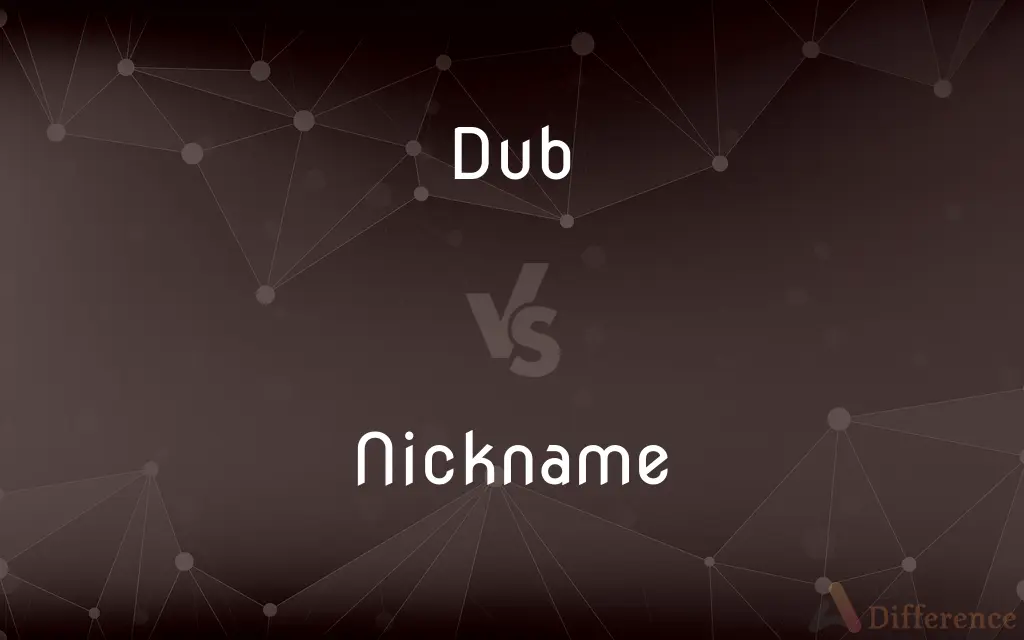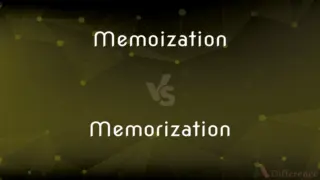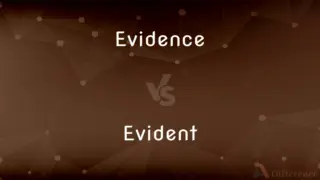Dub vs. Nickname — What's the Difference?
Edited by Tayyaba Rehman — By Urooj Arif — Updated on April 19, 2024
"Dub" refers to giving someone or something a new name, often ceremonially, while "nickname" is a familiar or humorous name given in place of or in addition to the official name.

Difference Between Dub and Nickname
Table of Contents
ADVERTISEMENT
Key Differences
Dubbing involves bestowing a title or name, often in a formal or ceremonial context, such as knighting someone. In contrast, a nickname is usually an informal name that friends, family, or colleagues might use, which often reflects a personal trait or anecdote. While dubbing can signify respect or the granting of a specific role or status, nicknaming typically arises from affection, familiarity, or teasing.
Dubbing can also be used in contexts like voice-over work, where voices are added to a film or video. This specific use of "dub" relates to substituting the original audio with another language. On the other hand, nicknames do not have such a usage context and strictly pertain to alternative names for individuals or occasionally places and objects.
Historically, dubbing has roots in medieval ceremonies, especially in the context of knighthood where individuals were "dubbed" knights by royalty. Nicknames, however, have evolved socially and can originate from playful interactions, memorable incidents, or characteristic traits.
In popular culture, characters or public figures are often dubbed with titles that reflect their persona or achievements, such as "The King of Pop" for Michael Jackson. Whereas nicknames are more intimately used, such as "MJ" for Michael Jordan, which is derived directly from his initials and used more informally.
The process of dubbing someone often involves a deliberate decision and, in cases of titles, formal recognition. Nicknames, however, can be spontaneously created and adopted among peers without any formal acknowledgment.
ADVERTISEMENT
Comparison Chart
Definition
To give a title or name
A familiar or informal name
Context
Ceremonial, formal
Informal, personal
Usage
Titles, voice-over work
Personal, familiar names
Connotation
Formality, granting of role
Affection, familiarity
Origin
Old English "dubban"
Middle English "ekename"
Compare with Definitions
Dub
To give an official name or title to.
He was dubbed Sir Lancelot by the king.
Nickname
A familiar or humorous name given instead of or in addition to the one belonging to a person, place, or thing.
His nickname, Buddy, fits his friendly nature.
Dub
To name or entitle something in a specific way.
The press dubbed the incident as The Miracle on the Mountain.
Nickname
A term used to describe someone or something in an affectionate or humorous way.
Speedy became his nickname after he won the race.
Dub
To nickname; to call by a distinctive title or epithet.
She was dubbed the fastest runner in the county.
Nickname
A name derived from a personal characteristic or a favorite phrase.
She's called Red because of her hair color.
Dub
To strike lightly with a sword in the act of conferring knighthood.
The young knight was dubbed at the royal ceremony.
Nickname
An informal handle used among friends or colleagues.
Everyone at work calls him Doc because of his PhD.
Dub
To perform the process of replacing the original dialogue in a film with dialogue in another language.
The movie was dubbed in Spanish for local audiences.
Nickname
A playful or affectionate moniker that captures someone's essence or a memorable trait.
Twinkletoes is her nickname due to her dancing skills.
Dub
To tap lightly on the shoulder by way of conferring knighthood.
Nickname
A nickname is a substitute for the proper name of a familiar person, place or thing. Commonly used to express affection, a form of endearment and sometimes amusement, it can also be used to express defamation of character, particularly by school bullies.
Dub
To honor with a new title or description.
Nickname
A descriptive name added to or replacing the actual name of a person, place, or thing.
Dub
To give a name to facetiously or playfully; nickname.
Nickname
A familiar or shortened form of a proper name.
Dub
To strike, cut, or rub (timber or leather, for example) so as to make even or smooth.
Nickname
To give a nickname to.
Dub
To dress (a fowl).
Nickname
(Archaic) To call by an incorrect name; misname.
Dub
To execute (a golf stroke, for example) poorly.
Nickname
A familiar, invented name for a person or thing used instead of the actual name of the person or thing, often based on some noteworthy characteristic.
"The Big Apple" is a common nickname for New York City.
Dub
To thrust at; poke.
Nickname
A familiar, shortened or diminutive name for a person or thing.
My name is Jonathan, but I go by my nickname, Johnny.
Dub
To beat (a drum).
Nickname
(transitive) To give a nickname to (a person or thing).
Gerald, nicknamed "Jerry", was usually a very cheerful person.
Dub
To make a thrust.
Nickname
A name given in affectionate familiarity, sportive familiarity, contempt, or derision; a familiar or an opprobrious appellation; as, Nicholas's nickname is Nick.
Dub
To beat on a drum.
Nickname
To give a nickname to; to call by a nickname.
You nickname virtue; vice you should have spoke.
I altogether disclaim what has been nicknamed the doctrine of finality.
Dub
To transfer (recorded material) onto a new recording medium.
Nickname
A familiar name for a person (often a shortened version of a person's given name);
Joe's mother would not use his nickname and always called him Joseph
Henry's nickname was Slim
Dub
To copy (a record or tape).
Nickname
A descriptive name for a place or thing;
The nickname for the U.S. Constitution is `Old Ironsides'
Dub
To insert a new soundtrack, often a synchronized translation of the original dialogue, into (a film).
Nickname
Give a nickname to
Dub
To add (sound) into a film or tape
Dub in strings behind the vocal.
Dub
An awkward person or player; a bungler.
Dub
The act of dubbing.
Dub
A drumbeat.
Dub
The new sounds added by dubbing.
Dub
A dubbed copy of a tape or record.
Dub
A mostly instrumental style of music originating in Jamaica, produced by remixing existing recordings to emphasize drum and bass rhythms and adding audio effects.
Dub
A puddle or small pool.
Dub
(transitive) To confer knighthood; the conclusion of the ceremony was marked by a tap on the shoulder with a sword.
Dub
(transitive) To name, to entitle, to call.
Dub
(transitive) To deem.
Dub
To clothe or invest; to ornament; to adorn.
Dub
(heading) To strike, rub, or dress smooth; to dab.
Dub
To dress with an adze.
To dub a stick of timber smooth
Dub
To strike cloth with teasels to raise a nap.
Dub
To rub or dress with grease, as leather in the process of currying it.
Dub
To dress a fishing fly.
Dub
To prepare (a gamecock) for fighting, by trimming the hackles and cutting off the comb and wattles.
Dub
To make a noise by brisk drumbeats.
Dub
To do something badly.
Dub
(golf) To execute a shot poorly.
Dub
To add sound to film or change audio on film.
Dub
To make a copy from an original or master audio tape.
Dub
To replace the original soundtrack of a film with a synchronized translation
Dub
To mix audio tracks to produce a new sound; to remix.
Dub
To open or close.
Dub
(rare) A blow, thrust, or poke.
Dub
An unskillful, awkward person.
Dub
A mostly instrumental remix with all or part of the vocals removed.
Dub
A style of reggae music involving mixing of different audio tracks.
Dub
A trend in music starting in 2009, in which bass distortion is synced off timing to electronic dance music.
Dub
A piece of graffiti in metallic colour with a thick black outline.
Dub
(countable) The replacement of a voice part in a movie or cartoon, particularly with a translation; an instance of dubbing.
Dub
A pool or puddle.
Dub
(slang) A twenty-dollar sack of marijuana.
Dub
(slang) A wheel rim measuring 20 inches or more.
Dub
A lock.
Dub
A key, especially a master key; a lockpick.
Dub
To confer knighthood upon; as, the king dubbed his son Henry a knight.
Dub
To invest with any dignity or new character; to entitle; to call.
A man of wealth is dubbed a man of worth.
Dub
To clothe or invest; to ornament; to adorn.
His diadem was dropped downDubbed with stones.
Dub
To strike, rub, or dress smooth; to dab;
Dub
To strike cloth with teasels to raise a nap.
Dub
To make a noise by brisk drumbeats.
Dub
To add sound to an existing recording, audio or video; - often used with in. The sound may be of any type or of any duration.
Dub
To mix together two or more sound or video recordings to produce a composite recording.
Dub
A blow.
Dub
A pool or puddle.
Dub
Give a nickname to
Dub
Provide (movies) with a soundtrack of a foreign language
Dub
Raise (someone) to knighthood;
The Beatles were knighted
Common Curiosities
How does one get a nickname?
Nicknames are usually given by family, friends, or colleagues, often based on personal traits, behaviors, or inside jokes.
What is the purpose of dubbing in films?
Dubbing in films involves replacing the original spoken language with another, allowing audiences in different regions to enjoy the movie in their native language.
Is dubbing only related to titles and knighthood?
Dubbing primarily refers to granting titles or names, particularly in ceremonial contexts like knighthood, but it also applies to audio work in media.
How do cultural differences affect nicknames?
Cultural norms influence what is considered an appropriate or affectionate nickname, and these can vary widely between different regions or groups.
Can someone reject a nickname?
Yes, individuals can certainly reject nicknames they find inappropriate or dislike, and it’s a good practice to respect their preferences.
Can a nickname become a person’s official name?
While unusual, it's possible for a nickname to become so predominant that it is used officially, but typically the legal name remains as is.
What role do nicknames play in literature?
In literature, nicknames can develop characters, reveal relationships, or enhance storytelling through memorable and descriptive tags.
What makes a good nickname?
A good nickname often reflects something memorable or distinctive about the person, and is usually easy to remember and say.
What are some famous examples of dubbed titles?
Historical figures like Sir Isaac Newton and fictional characters like Sir Lancelot are examples of individuals who were dubbed with titles.
How do nicknames affect interpersonal relationships?
Nicknames can strengthen bonds by showing intimacy and shared experiences but used inappropriately, they can also harm relationships.
Is dubbing considered a creative process?
Yes, dubbing, especially in media, requires careful adaptation of dialogue to maintain the original tone, character, and cultural context in a new language.
Why do people use nicknames?
Nicknames are used to express affection, familiarity, or to simplify longer names, making them a common part of social interactions.
How does one politely ask others to use a nickname?
Simply stating a preference like "I prefer to be called..." is a polite and direct way to introduce a nickname to others.
Can businesses have nicknames?
Yes, businesses can and do have nicknames, often derived from acronyms, shortened names, or features associated with their brand.
Do nicknames have any legal standing?
Generally, nicknames have no legal standing unless they are formally adopted as part of a legal name change.
Share Your Discovery

Previous Comparison
Memoization vs. Memorization
Next Comparison
Evidence vs. EvidentAuthor Spotlight
Written by
Urooj ArifUrooj is a skilled content writer at Ask Difference, known for her exceptional ability to simplify complex topics into engaging and informative content. With a passion for research and a flair for clear, concise writing, she consistently delivers articles that resonate with our diverse audience.
Edited by
Tayyaba RehmanTayyaba Rehman is a distinguished writer, currently serving as a primary contributor to askdifference.com. As a researcher in semantics and etymology, Tayyaba's passion for the complexity of languages and their distinctions has found a perfect home on the platform. Tayyaba delves into the intricacies of language, distinguishing between commonly confused words and phrases, thereby providing clarity for readers worldwide.
















































